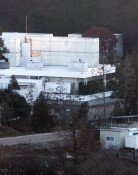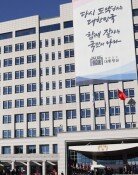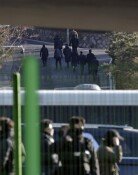Stalled reform pushes won FX value down
Stalled reform pushes won FX value down
Posted November. 22, 2000 15:30,
At 10 a.m. Nov. 21, the foreign exchange dealing room of C Bank received a flurry of buy orders for U.S. dollars placed by refinery firms. "What is the current rate? We could buy at 1,165 won per dollar." But after few seconds, the rate soared to 1,172 won, and dealers were embarrassed by the trend.
At around 11 a.m., the dealers obtained news that the foreign exchange authority would hold a meeting to study ways of countering the situation. Dealers hurriedly sold out dollars.
The won's exchange rate against the U.S. dollar, which had remained stable for several months, abruptly changed with an upward trend with severe fluctuation. The foreign exchange authorities, including the Ministry of Finance and Economy and the Bank of Korea, emphasize that there is no problem in supply of dollars. However, the prevailing reaction of dealers is that the market is in a serious situation.
Many market experts agree that it is stemming from the growing uncertainties in restructuring, with delay for input of public fund into insolvent financial institutions as the National Assembly is in trouble.
"Restructuring is being delayed at a time when export growth rate is slowing down and inflow of foreign capital is reducing," Oh Tae-Suk, general manager of Citibank, said.
In short, the won's value has been depreciating in line with uncertainties of the Korean economy. Externally, currency unrest in Taiwan and other Southeast Asian countries influenced the won's exchange value. With speculative buying of dollars, the exchange rate soared to the 1,160-won level per dollar. In 1997, shortly before the outbreak of the nation's foreign exchange crisis, there was a massive sell-off of won futures in the non-deliverable forward (NDF) market, sparking the severe fluctuation of won's exchange rate.
In the midterm and long term, the won's depreciation will strengthen the price competitiveness of Korean exports. In short term, however, it will trigger inflation as import prices calculated in won will soar.
What is more, the soaring exchange rate will discourage foreign investors, who net purchased 10.91 trillion won worth of Korean stocks so far this year, and it is likely that they could sell off the stocks and take their money out of the market to avoid foreign exchange losses.
The capital market also will be affected by it. Interest rates will increase in short term, although it will lead to falling interest rates as export companies will be able to solve their financial trouble through increased exports.
Now, the question is whether the soaring exchange rate will last. Economists seem to be mixed on prospects.
Park Hae-Shik, research fellow of the Korea Institute of Finance, said that the Korean economy would show healthy growth next year if ongoing restructuring is carried out as planned.
"If it happens, the exchange rate will stay at a low 1,100-won level per dollar at the end of the year and will hover at around 1,080 won in early next year," he predicted.
However, Chung In-Woo, manager of ABN AMRO Bank, anticipated that the exchange rate might hardly drop as domestic refinery firms place buy orders whenever it drops. He said that the exchange rate wouldn't slide below 1,150 won even at the year's end.
Chung Kyung-Joon news91@donga.com







